Reddit User Wants To Know If It's Wrong To Deny Your Friend For Taking Care Of Their Animals
We all have friends, and there are times when they might need our help, or even we might need their help. As the saying goes, "A friend in need is a friend indeed."
Sometimes, a few friends delegate all their responsibilities to one person and expect them to take care of everything entirely, which is simply unjustified. There are some people who take on the responsibility wholeheartedly, but after a while, it all starts to feel like a burden imposed on them.
At times, you may give something to a friend, like a living thing that requires a lot of time, patience, and even money. It becomes the giver's duty to ask their friends if they are comfortable, and it is just not right to abandon a friend after they have taken such good care of your things.
It is very selfish for a person to force and pressure someone to do something on their behalf, a job or duty that was solely the giver's responsibility. When they refuse to do it after a while, the giver needs to understand their friend's boundaries, respect them, and relieve them of that weight.
It is completely fine to help your friend when they need help and refuse to help further when the limit's been crossed.
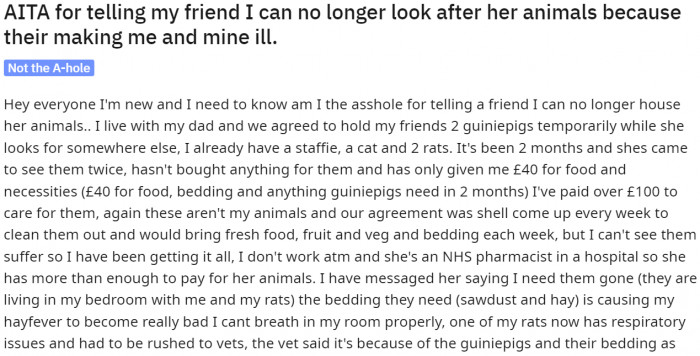
Everyone offers help to their friends, but when the friend starts taking advantage of it, we need to cut them off.
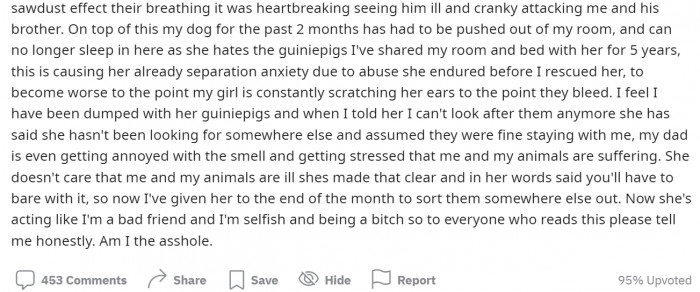
It's crystal clear that the friend just doesn't care about animals.
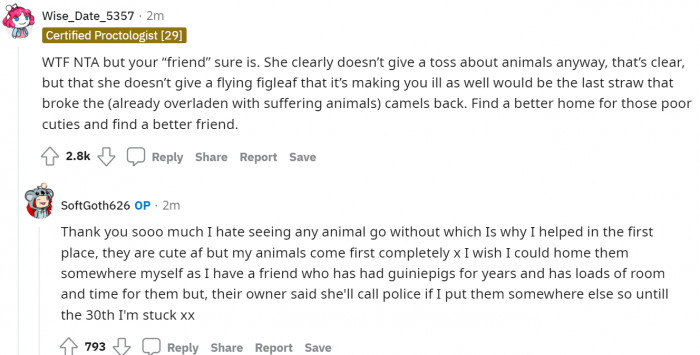
The Ethics of Caretaking
When it comes to caring for someone else's pets, the ethical implications can be quite complex. According to Dr. Esther Perel, a renowned couples therapist, "Friendship often creates implicit expectations for support, including caretaking responsibilities." This aligns with findings in psychology that suggest our sense of obligation is shaped by our relationships and the social contracts we establish with others. However, it’s also essential to recognize personal boundaries. As Dr. Michele Gelfand, a cultural psychologist, points out, "Not every friendship requires sacrificing one's own needs and comfort for the sake of others."
A good person would never hinder the peace of their true friends.

Well, it's time to take some strict and necessary actions.
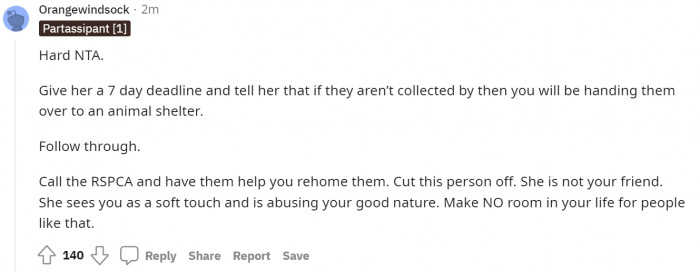
It's more about the animals here than their cost of living.

Declining to care for a friend's pets may evoke feelings of guilt or shame, particularly if one perceives such actions as selfish. Psychological research indicates that feelings of obligation can lead to emotional conflicts, especially when personal boundaries are challenged. According to studies from the American Psychological Association, it's crucial to balance personal limits with the desire to support friends.
Don't get used as a cheap pet hotel; at least be an expensive one.
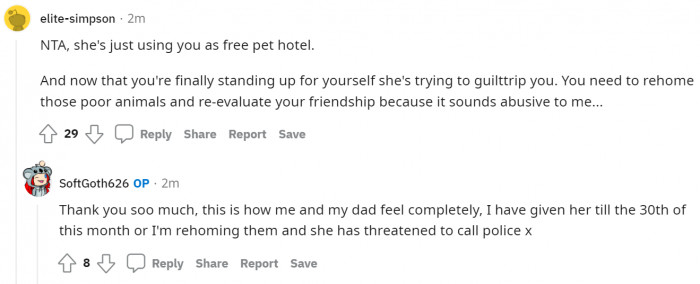
Hats off to you for going beyond your limits just to take care of the poor beings.
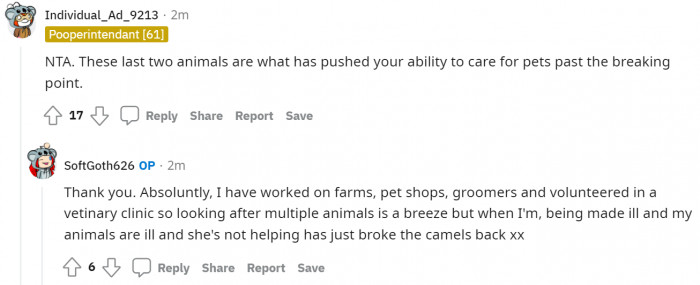
Know your exact responsibilities and make agreements before taking them up.

Navigating Friendships and Boundaries
To maintain healthy friendships, it's essential to communicate openly about boundaries. Research suggests that having clear conversations about what one is willing and able to provide can prevent misunderstandings and resentment. Techniques from conflict resolution studies can guide individuals in expressing their needs while still being supportive.
Establishing healthy boundaries is not about being unkind; instead, it's about fostering mutual respect and understanding within relationships.
Do your research before taking up the responsibility of a pet owner or a pet caretaker.

The packaging is just deceiving for getting more customers.

Sweet and simple and to the point.
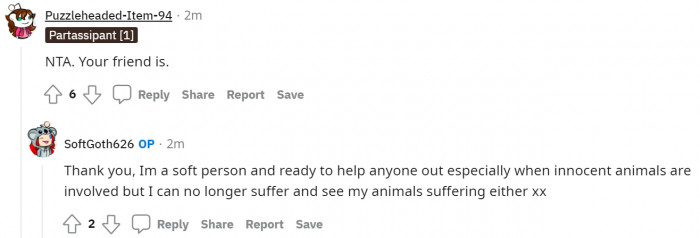
Moreover, it's helpful to frame the conversation around personal capacity rather than obligation. By articulating one's limitations in terms of availability or resources, individuals can express their stance without it sounding like a rejection of the friendship itself. This approach not only preserves the relationship but also reinforces personal integrity.
It's unfair to bail out at the last moment; that too of such a significant liability.
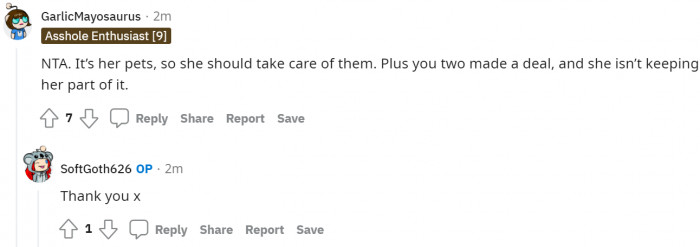
Here, the pet and the pet caretaker both were suffering on multiple levels.
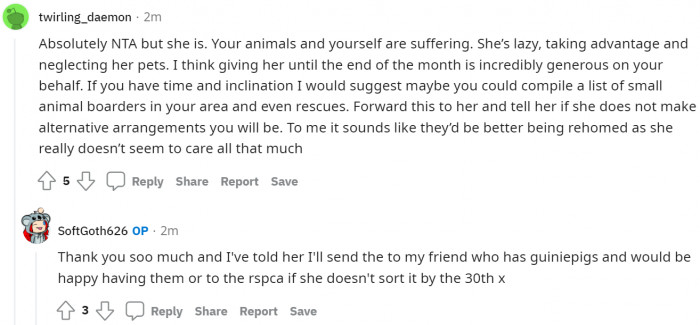
Yes, the friend is selfish and irresponsible; also a bad one.
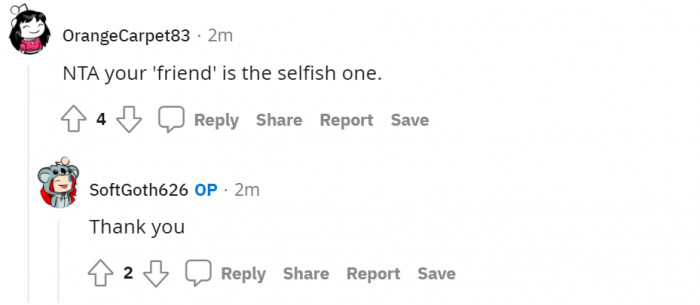
It's high time; give her an ultimatum.
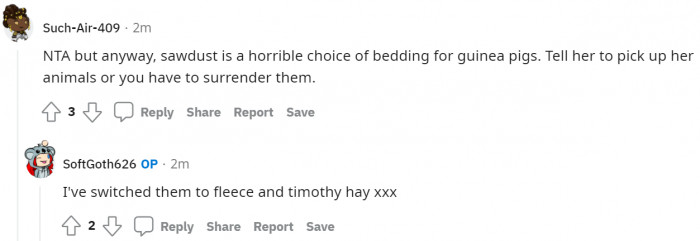
Don't let anyone take advantage of you, be it your friend.
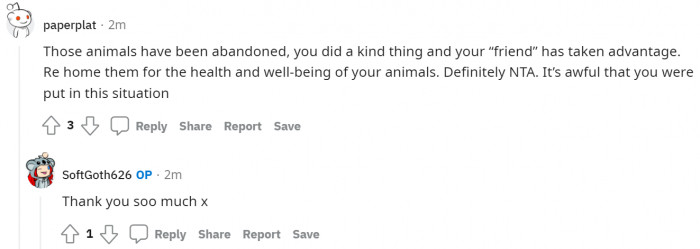
The pets must be wishing to stay with the new owner forever.

Take suggestions from strangers; they are often more helpful than your friends sometimes.
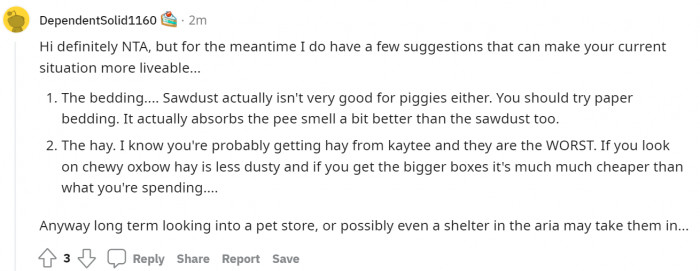
Indeed, it is a great problem to be over-generous.
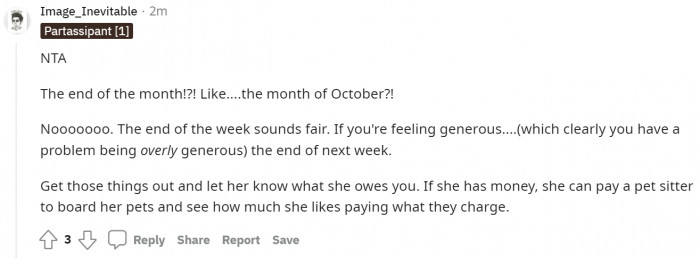
Do good for the piggies by rehoming them instead of giving them back to her.
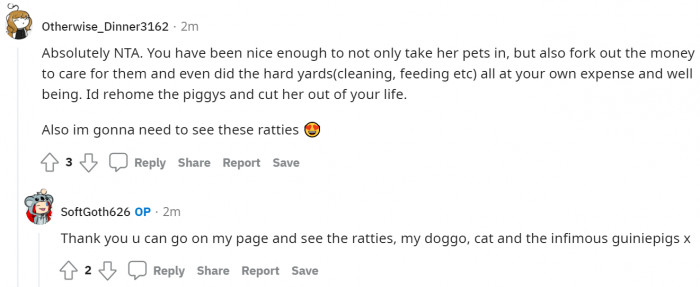
Sometimes, we take our friends for granted, which is fine because friends share a great and unique bond, but it's completely wrong to take advantage of their innocence and helpful nature.
Share this story with people with big hearts, and I hope it inspires them to say "NO" to their friends who try to take advantage of them.
Psychological Analysis
This situation reflects the delicate balance between friendship obligations and personal boundaries. It's essential to recognize that declining to care for a friend's pets does not equate to a lack of care for the friend; rather, it emphasizes the importance of self-awareness and healthy relationship dynamics.
Analysis generated by AI
Analysis & Alternative Approaches
Ultimately, navigating the complexities of friendship and caretaking requires a thoughtful approach that respects both personal boundaries and the needs of others. By engaging in open communication and setting clear expectations, individuals can maintain healthier relationships. Remember, being honest about your capacity to help can strengthen friendships rather than weaken them.



